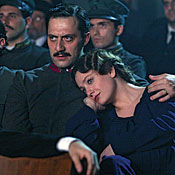- REVIEW
- READER REVIEWS
Vincere
|
|
Genre
Drama
Producer
Mario Gianani
Distributor
IFC Films
Release Date
Mar 19, 2010
Release Notes
NY
Official Website
Review
It’s not much of a challenge for ordinary filmmakers to ridicule, after the fact, the kind of Fascism embodied by that bald, eye-rolling cartoon Benito Mussolini, but in Vincere, the great Marco Bellocchio burlesques Il Duce while sweeping you up in the excitement of his rise. The movie, a near-masterpiece, is a monument to intoxication: of sexual conquest, of military conquest, and, most of all, of cinema.
Vincere (it means “win”) begins as a semi-operatic romance in which the gorgeous Ida Dalser (Giovanna Mezzogiorno) is carried away by the fire of the young radical Mussolini (Filippo Timi) as he moves from socialism and atheism (“With the guts of the last pope we’ll strangle the last king!”) to an obsession with becoming the next Napoleon. Post-coitus, standing naked on his balcony as war breaks out, Mussolini is (metaphorically) engorged, and Bellocchio’s filmmaking erupts into a flurry of newsreel footage, spinning slogans, cartoon silhouettes of soldiers in lockstep comin’ at ya out of the screen.
Just when you’re wondering if Bellocchio isn’t coming a little too close to celebrating that which he means to satirize, Vincere stops dead. Mussolini has married someone else and attempts to keep Dalser and their son, Benito, out of sight. The parade of Fascism passes on, and we, along with Dalser, watch Mussolini’s ascent from afar, as Italy slips into a kind of delirium—a lie perpetrated by a lunatic—while the mother of his firstborn son is locked away in a series of asylums and rages against the forces that would erase her from history. Carlo Crivelli’s score evokes the swirling strings of Bernard Herrmann’s North by Northwest, plus holy choirs to remind you this is madness, Italian style.
The second half lags, with too many scenes in which Dalser furiously tries to break through to the outside world. But gradually Vincere is revealed as a raging meditation on the power of art to lead us down lovely and false paths. Young Benito knocks a bust of Mussolini off its pedestal and does unhinged impersonations of Il Duce while his mother climbs the gates of her madhouse and, ever hopeful, tries to launch a missive to her son through a curtain of snowflakes. This is pure Bellocchio: The ones who see life as it is, a macabre sideshow, can never return.
In the nineties, with his messy but spirited psycho-comedies Kicking and Screaming and Mr. Jealousy, Noah Baumbach seemed on his way to becoming a new-style American farceur, a Feydeau for a generation stunted and bollixed-up by morbid self-attention. But with his semi-autobiographical The Squid and the Whale, Baumbach slammed on the brakes. He embraced the aesthetic of cringe. Unpleasant encounters that might have been glancing in his earlier films were stretched out to make you squirm. Characters had enough rope to hang not just themselves but their whole petty, dysfunctional families. In Margot at the Wedding, Baumbach used real time as a cudgel to punish his nasty little people—especially a mother (a brittle Nicole Kidman) whose narcissism left her clingy son bereft. In his latest film, Greenberg, he pushes the parents offscreen and moves the damaged son, the stunted man-child, to the center. He’s Roger Greenberg (Ben Stiller), a fortyish, unemployed New York carpenter who arrives in L.A. to house-sit for his wealthy older brother and also take care of the family dog, Mahler. The absence of Monster Mom and Monster Dad gives the movie a bit more air than Margot, and so does the move to the West Coast, where the characters have more stuff—furniture, swimming pools, cars, drugs—to take their minds off how much they hate themselves and everyone else. The film has many grace notes, and Baumbach and his cinematographer, Harris Savides, create layers of space to suggest a world in which people’s orbits don’t have to intersect. But the pall over Greenberg is as inevitable as the smog in the opening shots, each scene building to a wincer. There’s nothing to do except wait for the protagonist to appall you one more time.
As Greenberg, Stiller wears an expression I’ve never seen on an actor who wasn’t playing a serial killer. People reading ghost stories put flashlights under their chins to create an aspect of malevolence that Stiller has in normal light. The question is not what’s eating Greenberg but what isn’t? He’s prickly and paranoid, an injustice collector who writes long letters to various companies to avenge small slights. We know he has been hospitalized for depression; we can sympathize with his annoyance when a noisy family with permission to use his brother’s pool invades the blessed silence. Stiller is the star, and we can overlook almost anything—until he drunkenly begins to paw his brother and sister-in-law’s personal assistant, Florence (Greta Gerwig), a bright, lovely young woman barely holding her own life together. Greenberg grabs her with no preamble, no romantic badinage, no smile—just a kind of caveman sense of entitlement. And she doesn’t slug him. She has so little self-worth that she thinks he’s relationship material.
Art Exploits Life
After Mussolini abandoned and renounced her and their child, Dalser found herself treated like a mental patient in Fascist Italy—a setup that provides Bellochio with a powerful metaphor.
Related Stories
New York Magazine Reviews
- David Edelstein's Full Review (3/29/10)
